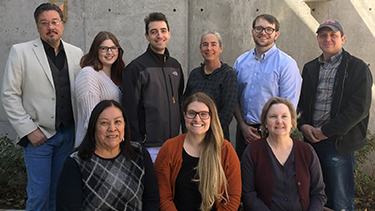NREL amicus brief supports Tribes in their first DAPL victory
June 30, 2017 - Tamara Williams

Third year law students participating in the Natural Resources and Environmental Law (NREL) Clinic, under the supervision of Professor Jeanette Wolfley (bottom row, left) provide expertise on a myriad of environmental issues.
On June 14, a federal judge ruled that the federal government did not adequately consider the environmental impacts of the Dakota Access Pipeline (DAPL). This gave the Standing Rock Sioux Tribe and the Cheyenne River Sioux Tribe their first win in a long fight over the controversial project.
In February, the Natural Resources and Environmental Law (NREL) Clinic, on behalf of the Association on American Indian Affairs (AAIA), and the Pueblo of Pojoaque, filed an amicus brief in support of the Tribes.

UNM School of Law Professor Jeanette Wolfley, who teaches in the NREL Clinic, and Elizabeth Lohah Homer (Class of 1989) of Homer Law Chartered, served as counsel for the amici curiae.
The brief argued that the United States has a trust duty to Indian tribes to protect tribal interests through tribal consultations and federal laws, such as the National Environmental Protection Act (NEPA).
“This is a remarkable decision because the federal court found the Corps of Engineers failed to take a hard look at the reports and evidence submitted by the Tribes during the environmental assessment process under NEPA,” says Wolfley. “It sends a message to the energy industry and the federal government that energy infrastructure rights-of-way will not be approved as a matter of course. Instead, they must be carefully reviewed and evidence received from tribes must be considered. NREL was honored to file a brief for its clients and supporting the Tribes’ challenges to the assessment. The UNM School of Law was the only law school to file a brief in support of the Tribes.”
The AAIA describes what’s at stake in AAIA Amici Brief in Standing Rock Case, partially reprinted below:
At stake are important environmental and cultural resources, including waterways, burial sites, and the traditional resources, of the Standing Rock Sioux Tribe and Cheyenne River Sioux Tribe, along the proposed Dakota Access Pipeline, which is now set to be drilled under Lake Oahe. Despite announcing scoping comments for an Environmental Impact State (EIS) under the normal procedures required under NEPA, the Army Corps of Engineers announced an about-face and approved the permit for the Dakota Access Pipeline without environmental and cultural reviews after a directive was issued by President Donald J. Trump regarding the Construction of the Dakota Access Pipeline.
In his ruling, U.S. District Judge James Boasberg of Washington, D.C. said the U.S. Army Corps of Engineers did “not adequately consider the impacts of an oil spill on fishing rights, hunting rights, or environmental justice, or the degree to which the pipeline’s effects are likely to be highly controversial.”
The court remanded the matter to the Corps to reconsider its evaluation. On June 21, the Court ordered further briefing from the parties on the remedy to be entered during the Corps’ evaluation.
For more background on the story, see:
Federal judge orders environmental review of Dakota Access pipeline
